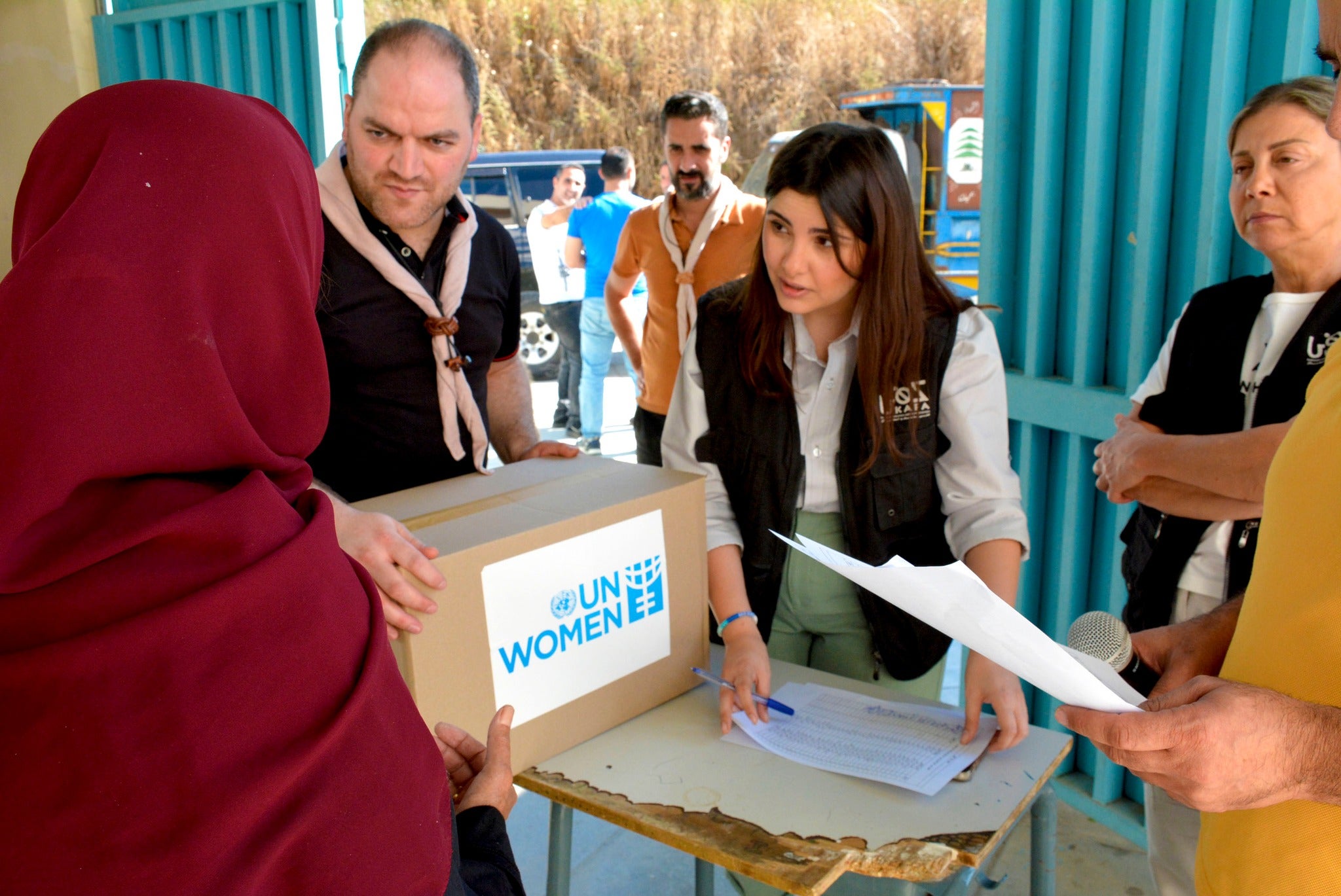On the frontlines: Women-led organizations lead Lebanon’s crisis response, despite significant challenges
Date:
(UN Women, Beirut, 10 December 2024). Driven by the intensifying conflict, the recent escalating humanitarian crisis in Lebanon has taken a profound toll on people’s lives. Lebanese health officials estimate that, since the escalation of hostilities on 8 October 2023, 4,047 people have been killed and 16,638 wounded, including at least 790 women and 316 children killed. Another 899,725 have been displaced – 51 per cent of whom are women and girls, who face heightened gender-specific vulnerabilities, both pre-existing and as a result of the conflict.
On the frontlines of the crisis response, women-led organizations (WLOs) are delivering critical, life-saving humanitarian assistance to affected populations, including women and girls in need. WLOs are uniquely positioned to address the urgent needs of local communities in Lebanon. Their deep connections and understanding of community dynamics enable them to respond effectively to the concerns of those they serve. As trusted and experienced actors in humanitarian, development and peace efforts, WLOs have the expertise needed to navigate Lebanon’s complex sociopolitical landscape, identify practical solutions and deliver impactful crisis responses in their communities.

Historically, WLOs have played a critical role in humanitarian response in Lebanon. Throughout the COVID-19 pandemic, these organizations were at the forefront, providing services to ensure women’s sexual and reproductive health and rights and to assist survivors of gender-based violence. Moreover, WLOs have been active responders to address the needs of displaced Syrians as a result of the conflict in Syria, delivering protection services in camps and setting up spaces for women-focused activities and services. Despite their critical role, WLOs often face significant resource and recognition gaps. These organizations deserve greater support, visibility and amplified voices, both nationally and internationally.
In October 2024, UN Women conducted a rapid assessment to increase understanding of the involvement of WLOs in Lebanon’s humanitarian response in the context of the current conflict and identify their role and challenges. Through an online survey from 16– 28 October with 50 WLOs, 47 reported being involved in the humanitarian response, highlighting their critical yet under-resourced contributions.
Women’s rights organizations and WLOs in Lebanon play a distinct role in humanitarian efforts, setting them apart through their focus on both immediate needs and long-term community support, as well as their commitment to serve the most affected and marginalized groups:
- Delivering critical, life-saving assistance: This includes providing protection-related services (70 per cent); essential relief items, like blankets (45 per cent); food assistance (40 per cent); and emergency education (40 per cent).
- Reaching the most vulnerable groups: This includes assisting refugees (60 per cent), migrant domestic workers (36 per cent), young women (64 per cent), older women (45 per cent), and people with disabilities (40 per cent).
- Shelter support: These organizations also lead in providing shelter through collective accommodations (85 per cent) and rented or hosted accommodations (62 per cent).
Despite their critical role, WLOs face significant challenges:
- Humanitarian funding is not reaching women’s rights and women-led organizations. According to the survey, only 8 per cent of the funding for humanitarian response goes to WLOs. Insufficient funding limits the capacity of WLOs to deliver emergency relief and life-saving assistance. Currently, 47 per cent of surveyed WLOs serve fewer than 1,000 people.
- Participation in humanitarian coordination structures is often restricted to specific sectors and working groups, such as gender-based violence and protection, thus limiting the footprint and capability of certain WLOs to be part of comprehensive decision-making and response, thereby risking their marginalization.
- Staff safety and security impact 88 per cent of WLOs, significantly limiting their ability to reach affected populations safely.
UN Women calls attention to the need for the full participation of WLOs in the planning, implementation, monitoring and evaluation of all humanitarian services to ensure that response efforts during and after the conflict uphold core humanitarian principles and standards and address the needs of the most vulnerable women and girls within the crisis-affected population.
For additional information including on recommendations, please refer to the full report.
****
Media Contacts:
Media Team: [ Click to reveal ]
Roula Rached: [ Click to reveal ]